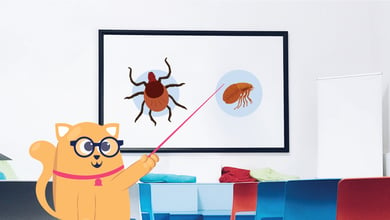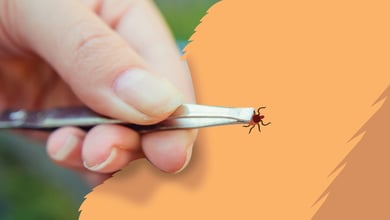Preventing Fleas & Ticks on Pets: 4 Protective Tips

Finding fleas or ticks on their dog or cat can be distressing for any pet parent. Fleas and ticks are troublesome external parasites that hide in your pet's fur and latch onto their skin to feed on their blood. They can cause terrible itching, skin irritation, and even health problems to your beloved pet.
In addition to itchy, inflamed skin, flea infestation on your pets can cause tapeworm infections, skin allergies, and infections. Tick infestation can cause tick-borne diseases such as Rocky Mountain spotted fever, Lyme disease, and anaplasmosis. Ticks can transmit diseases within one to two days of attachment to your cat or dog!
Key Takeaways:
- Preventing fleas and ticks on pets requires a comprehensive approach, including cleaning, grooming, yard maintenance, and using appropriate preventatives.
- Regular veterinary guidance is essential for effective prevention.
These diseases can also be zoonotic, so it's essential to prevent fleas and ticks to keep your pets healthy and protect yourself, too. This guide will provide step-by-step instructions on how to prevent fleas and ticks on dogs and cats.
1. Sanitation
A flea infestation in your home can threaten your peace of mind, with numerous flea eggs hatching daily. Flea control measures include:
- Routine vacuuming of furniture, couches, and carpets
- Proper disposal of the bags after vacuuming
- Frequent washing of pet bedding in hot water to kill flea larvae
In the case of severe infestation, consult your veterinarian to help you choose pet-friendly indoor pest control products for your home.
2. Pet Grooming
Besides the aesthetic value that regular pet grooming adds to your cats or dogs, it can also help you identify fleas and ticks as soon as they latch on to your pets. You can palpate your pet's skin or use combs and brushes to locate ticks, then remove them using tweezers.
A flea comb can help you spot flea eggs or droppings, while a simple bath can remove adult fleas. However, you'll need veterinary advice on medicated bath additives to kill adult fleas and their eggs.
Regular grooming will help you detect these pests early enough to prevent infestation, so be sure to set up a schedule.
3. Yard Care
Keeping your yard clean eliminates the places fleas and ticks hide and breed in and prevents re-infestation. You should regularly mow the grass and remove leaves and other debris.
If these parasites are present in your yard, you can consider using environmental treatments. However, you should first seek veterinary advice on pet-safe environmental treatment options and follow product instructions carefully.
Prevent animal intruders such as feral cats and wildlife from entering your yard since they could bring fleas and ticks with them. You may need to repair fences and openings in sheds and garages. Avoid leaving bowls of food and water out, as these attract unwanted visitors.
4. Flea and Tick Preventatives
Flea and tick preventatives are medications routinely used to keep off or kill fleas and ticks. Here is a list explaining different types further:
Topical treatments
Most topical treatments can kill adult fleas and larvae on contact, making them a popular method for preventing fleas on dogs. There are no products that kill ticks on contact, but they will die after they've been attached for 24 hours.
Flea and tick shampoos and sprays
These must only be used under your veterinarian's supervision since they might be toxic if ingested by your pets. Their effects are short-lived and non-effective for long term treatment.
Flea and tick collars
Flea collars prevent fleas around the neck but have a limited effect elsewhere on the body. They must be applied tightly to make skin contact. While they may help deter new fleas from approaching your pet, they are often ineffective for an existing flea infestation.
Oral medications
Oral flea and tick preventatives contain ingredients such as isoxazoline, spinosad, or lufenuron. Those containing isoxazoline kill fleas and ticks as soon as they bite your pet. Spinosad and lufenuron components are only effective in flea control. Most oral medications last for 30 days, while others offer protection for three months. Talk with your veterinarian to find the most suitable option.
Get Your Pet’s Health Checked Out at Home
Say goodbye to stressful vet visits and hello to a comfortable wellness exam in your pet's favorite spot.
Conclusion
Pet flea and tick prevention is a routine process for pet parents to maintain their pets' health and well-being. Often, it is much simpler than dealing with disease consequences such as dermatitis and Lyme disease. The best course of action is to incorporate all the steps above for effective prevention.
Flea infestation on your pet requires follow-up treatments to break the flea life cycle. The fleas may become resistant to flea control products and insecticides, so talk to your veterinarian about the most effective products in your area. Many over-the-counter options are ineffective or may be unsuitable for your pet's needs.
Although fleas and ticks thrive during hot seasons, they can be resilient throughout the year. Thus, booking a veterinary wellness exam to determine your pet's health status, susceptibility to fleas and ticks, recommendations for year-round prevention, and how to avert future infestations is essential.
Frequently Asked Questions
Do dogs need flea and tick medicine every month?
Yes, dogs require flea and tick medicine monthly to effectively prevent infestations. This applies to both topical and oral treatments. Skipping doses can lower the medication's efficacy and leave dogs vulnerable to parasites.
How do I know if my pet has fleas or ticks?
Check for excessive scratching in a specific area of their body. Also, look for fleas on their hair follicles (adult fleas are reddish-brown), and check for flea dirt (tiny brownish-black granules).
Are there natural remedies to prevent fleas and ticks on pets?
Natural remedies to prevent fleas and ticks on pets include:
- Keep your home and yard clean and tidy
- Wash your pet with soap and water
- Regular pet grooming
Some people use rosemary, cedarwood, and citronella as preventatives, but you should always check with a veterinarian before using herbal medicines on your pet as many are not effective or can be toxic if ingested.
What is the best preventive product for my pet's specific needs?
It is essential to consult a veterinary professional to help you choose the best preventive product for your pet, catering to their lifestyle and the local parasite population where you live.
How often should I groom my pet to prevent fleas and ticks?
Grooming your pet a few times a week, depending on the breed (long-haired pets need more grooming), will help prevent fleas and ticks.





